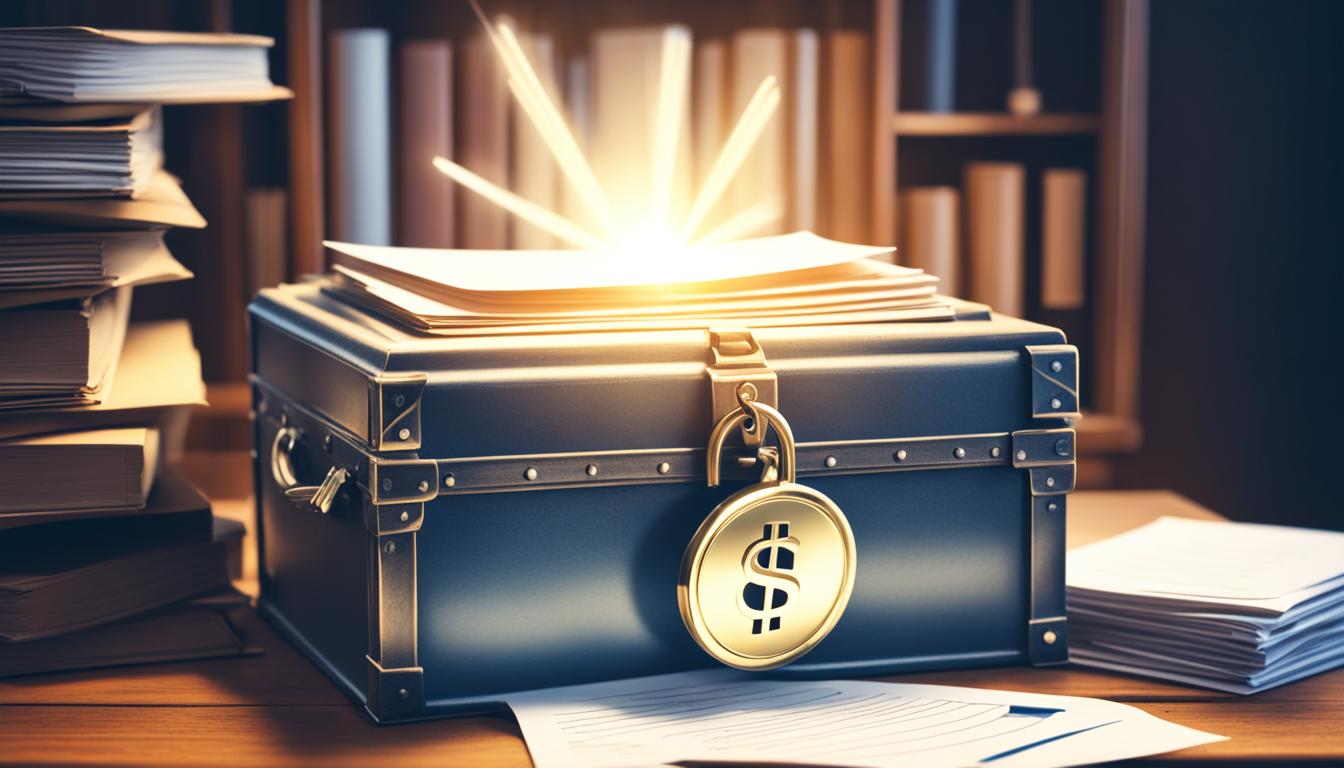Ever thought about the legal side of blogging? As a blogger, dealing with online content laws and intellectual property rights can be tough. But don’t worry, learning about the legal side of blogging is key. It helps protect your work and keeps your blog safe for the long run.
Did you know there are over 600 million blogs out there? The blogging world is expected to hit $31.7 billion by 2024. With so much content, knowing the legal rules is a must. Ignoring them can lead to big problems, like copyright issues or trademark disputes.
This guide covers all the legal stuff you need to know about blogging. We’ll talk about copyright, disclaimers, privacy policies, and more. Get ready to learn about the legal traps bloggers often face. Let’s dive in and make sure your blog follows the law.
Overview of Blogging and the Legalities Involved
Blogging lets people share their thoughts and connect with others online. But, it also means you have legal duties to follow. Legal considerations in blogging help protect your rights and avoid breaking others’ laws.
Bloggers need to know the laws about copyrights, trademarks, and defamation. Not following these laws can lead to big problems, like copyright claims or lawsuits. It’s key to understand legal responsibilities for bloggers to keep your blog safe and legal.
This guide will cover the main legal aspects of blogging. You’ll learn how to protect your work and use others’ content legally. By understanding legal considerations in blogging, you can make a successful and legal blog.
It’s important to stay up-to-date with blogging laws to keep your blog going strong. By being careful and informed, you can make sure your blog is a safe space for your ideas and creativity.
Copyrights and How They Apply to Blog Content
As a blogger, knowing about copyright law is key. It helps protect your work and use others’ work right. Copyright lets creators control how their work is used and shared. This includes text, images, videos, and more on your blog.
What Is a Copyright?
A copyright is a legal right for creative works like blog posts and videos. When you make something original for your blog, you own the copyright. This means no one can use or copy your work without your okay, except under fair use.
Protecting Your Original Blog Content
To keep your blog content safe, show you own the copyright. Put a copyright notice at the end of your blog posts. You can also register your work with the U.S. Copyright Office for more legal protection.
Using Copyrighted Materials on Your Blog
You own the copyright to your blog work, but you might use copyrighted materials from others, like images or videos. Make sure to get the right permissions or use fair use. This lets you use copyrighted stuff for things like sharing opinions, critiquing, or teaching.
Learning about copyright law for bloggers helps you protect your blog content. It also lets you use copyrighted materials right, avoiding copyright infringement issues.
Trademarks and Their Significance in Blogging
As a blogger, you might not know how important trademarks are. They protect your brand name, logo, and other unique parts. Knowing about trademarks is key for trademarks in blogging. It helps you avoid trademark infringement and use them legally to protect your brand.
A trademark is a symbol, word, or phrase that makes a brand or product stand out. They are protected by law and can be owned by people, businesses, or groups. For bloggers, trademarks are important, especially if you want to make money from your blog or promote products.
To use trademarks right on your blog, you need to know what trademark infringement is. This means using a trademark without permission, making a similar mark that confuses people, or using it in a way that lessens its unique quality. By following these rules, you can make sure you’re using trademarks legally and protecting your brand as a blogger.
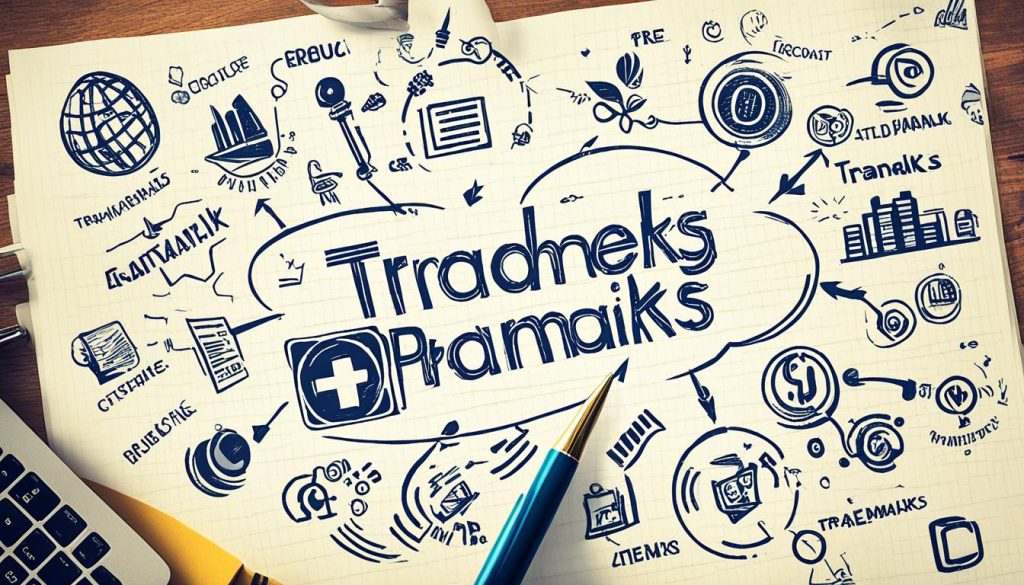
Remember, trademarks are key to brand protection for bloggers. By understanding and respecting trademark laws, you can build a strong, recognizable brand. This way, you can avoid legal problems later on.
Legal aspects of blogging
As a blogger, knowing the legal side of your work is key. One important thing to think about is trademark infringement. This happens when you use a trademark in a way that confuses people or weakens the brand’s image. This includes using a brand’s name, logo, or other unique parts without permission.
What Constitutes Trademark Infringement?
Trademark infringement in blogging can happen in many ways, like:
- Using a trademark in your blog’s title or domain name without okaying it first
- Adding a trademark into your blog’s content, like in product reviews or talks
- Showing a trademark’s logo or other visuals without the brand owner’s say-so
It’s key to watch out for these issues and protect your blog from legal trouble.
Using Trademarks Legally on Your Blog
There are ways for bloggers to use trademarks legally. This includes:
- Getting the needed licenses or permissions from the trademark owner
- Using the trademark under fair use exceptions, like for commentary, criticism, or news
- Learning about your state and federal trademark laws to follow them
By knowing the legal rules and using brand protection strategies for bloggers, you can handle trademark infringement in blogging and legal use of trademarks on your blog well.
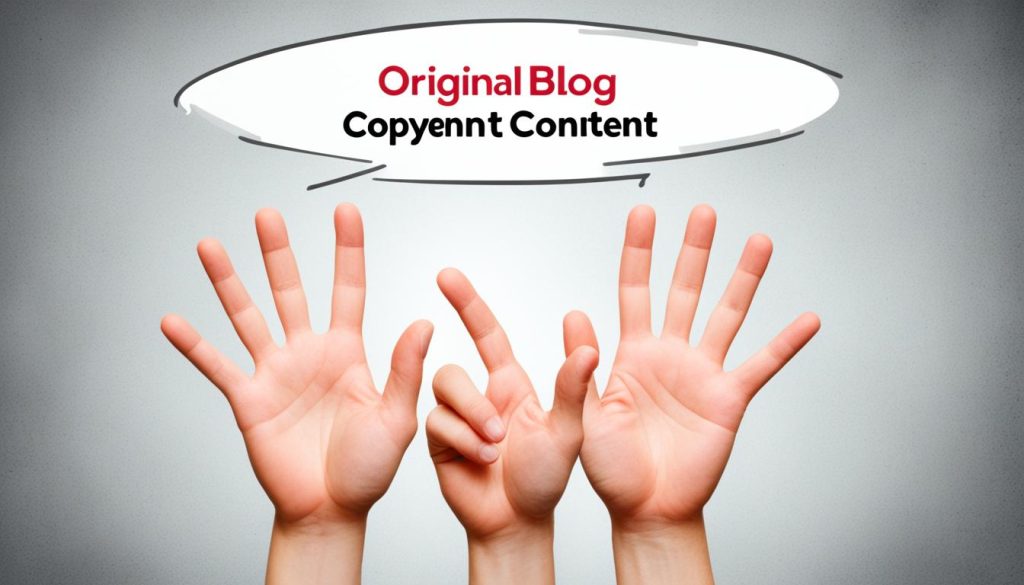
Blogging and Plagiarism: Avoiding Legal Issues
As a blogger, knowing about plagiarism and how to give credit is key. Plagiarism means using someone else’s work without saying it’s theirs. This not only hurts your blog’s trustworthiness but can lead to big copyright infringement problems.
Understanding Plagiarism
There are many ways to plagiarize in blogging, like copying text, images, or other content without saying where it came from. It’s important to know that even if it was not on purpose, plagiarism can lead to legal trouble. Bloggers must be careful to make their content their own.
Properly Attributing Content Sources
To dodge plagiarism in blogging and keep track of where your content comes from, follow these steps:
- Use proper citation methods to credit the original creators of your blog’s content.
- Link to the sources of any outside info or materials you use.
- Get the right permissions or licenses for copyrighted stuff like images or videos.
- Make it clear what’s yours and what’s from somewhere else.
By knowing and doing these things, bloggers can stay away from legal issues with plagiarism. They make sure their content is ethical and follows the rules.
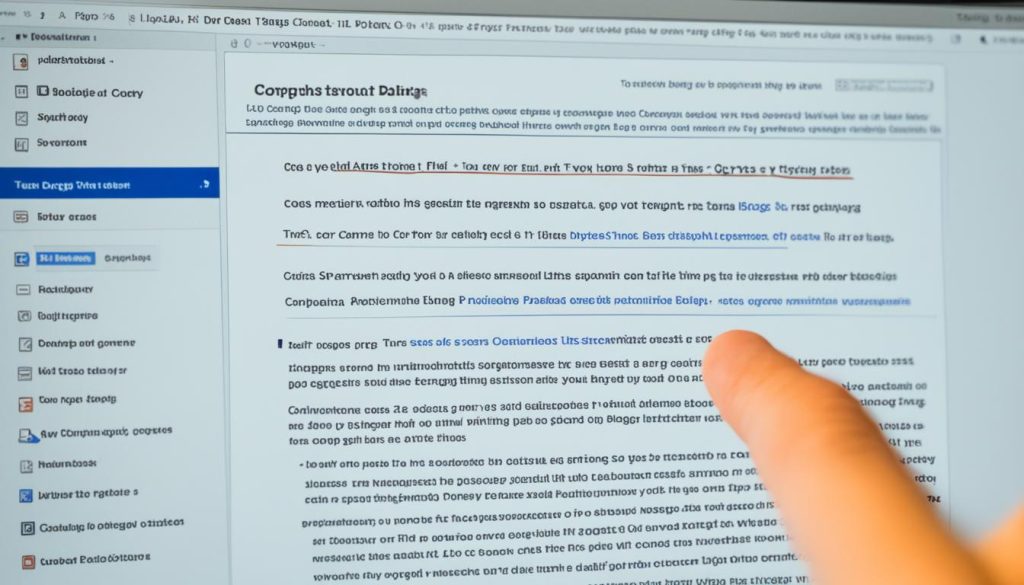
Using Images, Videos, and Other Media on Your Blog
As a blogger, adding visually appealing content can make your blog more engaging. But, you must know the legal rules for using images, videos, and other media. Using copyrighted material without permission can lead to big legal problems, like fines and lawsuits.
Obtaining Licenses and Permissions
To avoid legal trouble, always get the right licenses and permissions before using copyrighted media. This includes images, videos, audio clips, and text. Obtaining licenses for media can be done by buying stock media or asking the copyright holders for permission.
Understanding Fair Use
The idea of fair use in blogging lets you use copyrighted material without permission for certain reasons, like commenting, criticizing, or teaching. Bloggers need to follow fair use rules to make sure they’re not breaking copyright law and media usage. This might mean using short parts, giving credit, and changing the content a lot.
- Learn about fair use principles, including four key factors: purpose, nature of the work, amount used, and market effect.
- Make sure your use of copyrighted material fits within fair use exceptions to avoid using copyrighted media on blogs without permission.
Knowing the legal side of using images, videos, and other media on your blog helps you make engaging content. It also lowers the risk of copyright issues and legal problems.

Disclaimers and Privacy Policies for Bloggers
As a blogger, it’s key to know the value of having clear blog disclaimers and a full privacy policy. These legal steps protect you and make sure your readers know what to expect. They tell your readers about your blog’s content and how their personal data is used.
Importance of Disclaimers
A blog disclaimer explains what your blog covers and its limits. It helps protect you by saying your blog isn’t professional advice. It tells readers to seek experts for their needs. Disclaimers also set clear expectations and prevent confusion.
Creating a Privacy Policy
A privacy policy is key for legal protection for bloggers. It tells your readers what personal info you collect, how you use it, and their rights. A good privacy policy shows you care about transparency in blogging and builds trust with your readers.
| Key Elements of a Blogger’s Privacy Policy | Purpose |
|---|---|
| Collection of Personal Information | Explain what types of personal data you collect, such as email addresses, IP addresses, and user activity. |
| Use of Personal Information | Outline how you use the collected data, such as for newsletter subscriptions, website analytics, or targeted advertising. |
| Data Security and Storage | Describe the measures you take to protect user data, such as encryption and secure storage. |
| User Rights and Control | Inform users about their rights to access, update, or delete their personal information. |
Sharing your blog disclaimers and privacy policies for bloggers builds trust with your readers. It makes sure your blog follows the law, offering legal protection for bloggers and transparency in blogging.
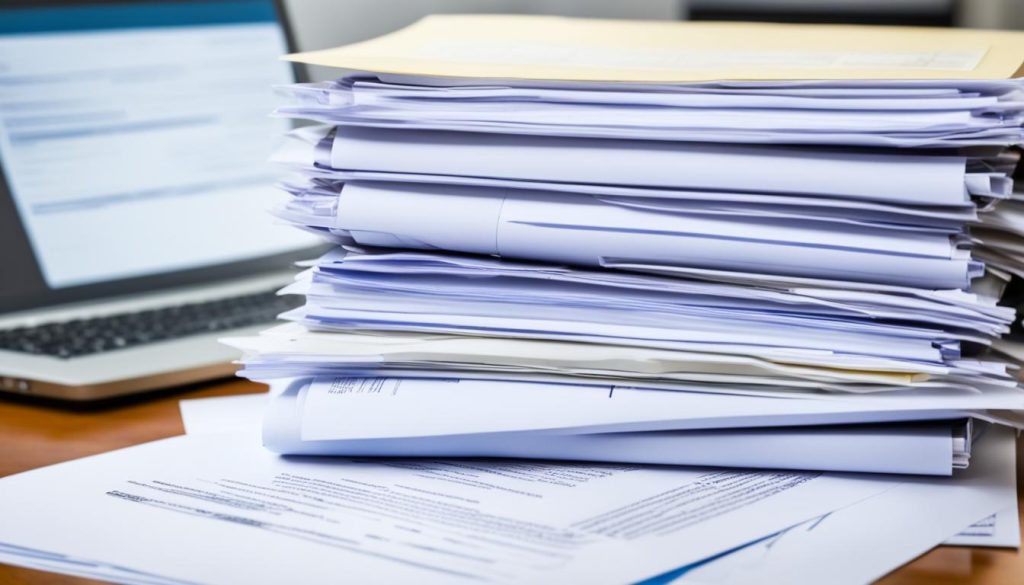
Affiliate Marketing and Advertising on Blogs
As a blogger, affiliate marketing and advertising can make your blog profitable. But, you need to know the legal rules. It’s important to be clear about your ads and follow the rules to stay safe.
Disclosure Requirements
When you use affiliate marketing in blogging or show ads, you must tell your readers about it. This keeps your readers informed about the ads they see. Not telling them can lead to legal trouble.
Advertising Regulations for Bloggers
Blogging has its own rules for ads. You can’t make false claims or show certain types of ads. Following these FTC compliance for bloggers rules is key to being ethical and avoiding fines.
Knowing the legal side of affiliate marketing and ads helps you make money the right way. It keeps your blog honest and builds trust with your readers. Staying up to date with the rules helps you blog legally and safely.
Defamation and Libel Concerns for Bloggers
As a blogger, knowing about defamation and libel is key. These issues can hurt your blog and put you at risk. Defamation means spreading untrue stories that damage someone’s reputation. Libel is when this happens in writing.
To avoid legal trouble, be careful with what you post. Don’t spread rumors or say things that aren’t true. Make sure quotes and info you share are correct to dodge libel claims.
It’s important to know the laws about defamation in blogging and libel laws for bloggers. This helps you stay safe and keep making good content. Learn about legal rules for reporting on famous people and court cases. Also, know about special laws and insurance for bloggers facing defamation claims.
| Key Considerations for Bloggers | Potential Legal Implications |
|---|---|
| Verifying the accuracy of information before publishing | Liability for defamation or libel |
| Distinguishing between statements of opinion and verifiable facts | Increased risk of legal disputes and lawsuits |
| Adhering to responsible and ethical content creation practices | Damage to personal and professional reputation |
Understanding defamation and libel concerns helps protect your blog and you. Focus on making responsible content and check your facts. This way, you can dodge legal problems in blogging.
Data Privacy and GDPR Compliance
As bloggers, we must put data privacy first for our readers. The General Data Protection Regulation (GDPR) is key, especially for us in or serving the European Union. We must protect personal info like email addresses and get the right consent from our readers.
To follow GDPR compliance, bloggers need to use strong security and clear privacy policies. Not following these rules can lead to big legal troubles. So, it’s vital for us to know and follow the laws.
- Get clear consent from readers before using their personal data
- Create a detailed privacy policy for how you handle reader info
- Use strong security to protect data privacy for bloggers
- Keep up with the latest GDPR compliance updates
By focusing on protecting reader info and following GDPR, we gain our audience’s trust. This helps us avoid legal problems. It’s key for responsible and ethical blogging.
| Requirement | Description |
|---|---|
| Consent | Get clear consent from readers before using their personal data |
| Privacy Policy | Create a detailed policy for protecting reader info |
| Security Measures | Use strong security to protect data privacy for bloggers |
| Compliance Updates | Keep up with the latest GDPR compliance updates |
Intellectual Property Rights for Bloggers
As a blogger, you have certain rights over the content you make. These include copyright, trademarks, and sometimes patents. It’s key to know and protect these rights to keep your work safe and stop others from using it without permission.
Copyright law gives you the right to control your original work. This covers your blog posts, images, videos, and more. You can decide who can copy, share, show, perform, or make new versions of your work.
Trademarks help protect your blog’s brand and identity. By registering a trademark for your blog’s name, logo, or unique parts, you stop others from using similar branding that could confuse your readers.
Sometimes, you can get patents for new tech solutions or methods you use on your blog. This could be for unique features, tools, or processes that make your blog stand out.
To protect your intellectual property rights, learn about the laws and best practices. Knowing and using your rights helps keep your work and creativity safe. This lets you grow your blog with confidence.
Your blog’s content, branding, and unique features are important and need legal protection. Stay updated and take steps to secure your intellectual property rights as a blogger.
Legal Risks and Liabilities in Blogging
As a blogger, knowing about legal risks and liabilities is key. You could face issues like copyright infringement or defamation. It’s important to protect your blog to avoid legal trouble.
Make sure you don’t use copyrighted material or trademarked phrases without permission. This can lead to serious legal problems. Always get the right licenses and give credit where it’s due. Also, be careful not to say anything false or misleading that could be seen as defamatory.
Privacy and data protection are big concerns for bloggers too. You must follow laws like the GDPR to protect your readers’ privacy. Having clear privacy policies and getting the right consents can help you avoid these issues.

